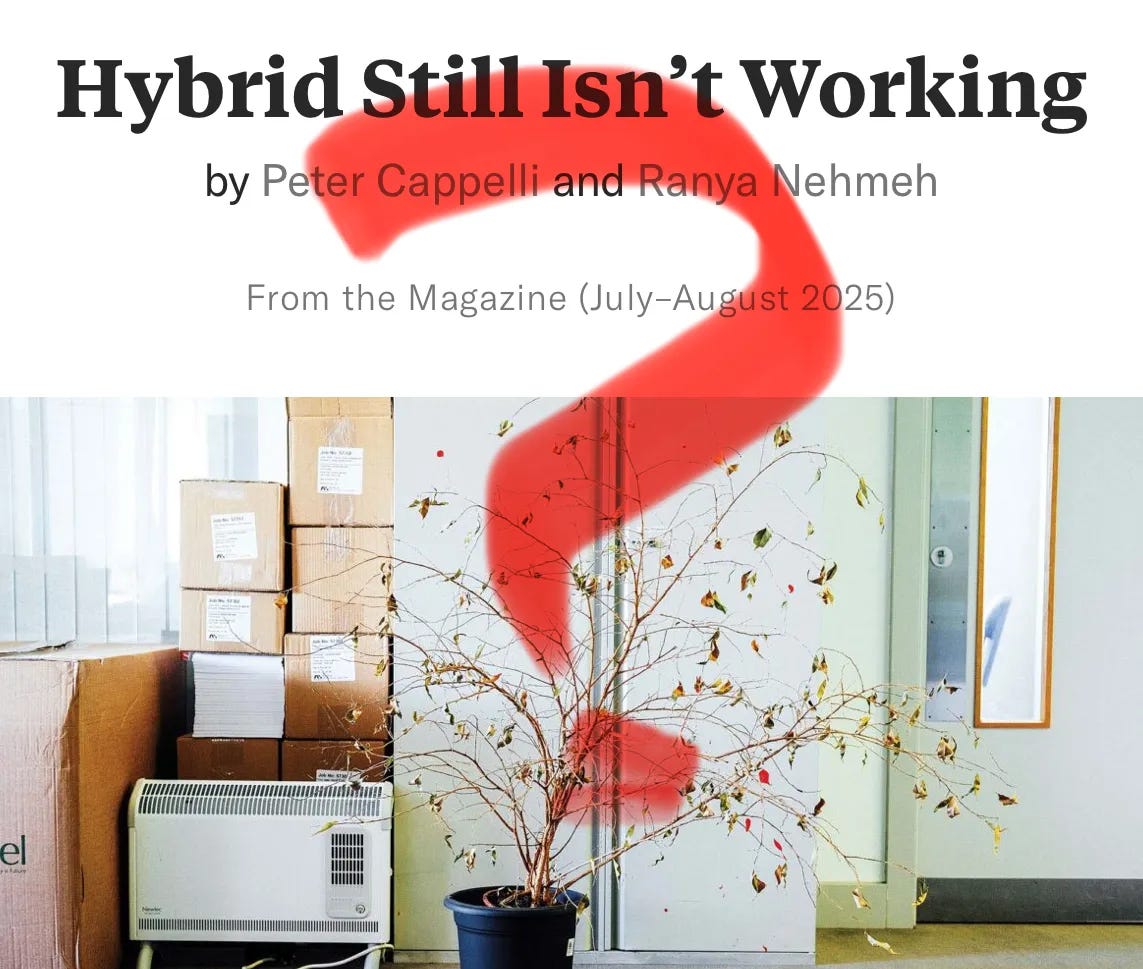JPMorgan's RTO Morale Fallout
Plus, when academics ignore the research and reality of hybrid work
👋 Happy Tuesday! New data from WFH Research's Survey of Working Arrangements and Attitudes reveals the stubborn reality of RTO mandates: compliance with full-time office requirements has barely moved, creeping from 46.6% to just 49.1% over six months. Despite some companies renewed push for in-person collaboration, worker preferences seem to remain unchanged.
In this week’s edition:
😥 JPMorgan’s Morale Problem
📊 Companies Pick Office Sides
❌ The Hybrid Work Misdiagnosis
Current Subscribers: 10,025
Please forward to colleagues and friends!
THIS WEEK’S FLEX FOCUS 🔍
JPMorgan’s RTO Mandate Chips Away at Employee Morale
JPMorgan's latest internal survey—capturing responses from 90% of its 284,000 workforce—shows a measurable drop in health and well-being scores directly tied to its March mandate requiring full-time office attendance.
This isn't just about one bank's policy. It's about the hidden costs of the RTO wars playing out across corporate America. While JPMorgan executives doubled down on their belief that physical presence drives collaboration and performance, employees voted with their survey responses, citing deteriorating work-life balance and wellness as primary concerns. The bank's internal documents had anticipated potential increases in disengagement and turnover.
As other financial giants take divergent paths (Goldman Sachs has enforced full office attendance since 2023, Citigroup has maintained two remote days), JPMorgan's transparency offers rare data on what many companies fear to measure. The question isn't whether RTO mandates work, but whether the morale cost is worth the perceived collaboration gains, and how long companies can sustain policies their employees are quantifiably rejecting.
FLEX WORK QUICK HITS 💥
Stay ahead of the curve with our curated roundup of the trending flexible work stories making waves right now. Here's what you need to know 👇
Entrepreneur: Citigroup offers its 229,000 hybrid employees the option to work remotely for any two weeks in August, reinforcing its flexible work commitment while competitors like JPMorgan mandate full office returns.
MSN: Dropbox CEO Drew Houston slammed RTO mandates as outdated, comparing forcing employees back to the office to "trying to force people back into malls and movie theaters" in today's changed world.
Fortune: Google is offering voluntary buyouts to select U.S. teams while tightening its RTO policy for remote workers living within 50 miles of offices, though executives worry about losing top performers in the competitive AI race.
Business Insider: Dell's five-day RTO mandate has led to inconsistent enforcement across teams, with some employees working full days while others "badge in and leave," creating workplace tensions and in-office politics among staff.
STAT OF THE WEEK 📈
Companies Pick Sides on Office Policies
The data shows 57% of US companies take a polarized approach, with 33% requiring full-time office presence and 24% having no weekly minimum.
The shift toward more office time reflects two key changes: firms requiring zero days dropped from 32% to 24%, while those requiring 3-4 days increased from 21% to 31%. These changes combine to increase average office expectations by 13% over the past year. One-day (2%) and four-day (3%) requirements remain uncommon among US companies.
FLEXPERT INSIGHTS 🧠
When Academics Ignore Research (and Reality)
What if the entire debate about hybrid work is missing the point? In his latest Work Forward newsletter, Brian Elliott tears down recent arguments from Wharton’s Peter Cappelli and Ranya Nehmeh against flexibility, exposing a fundamental misdiagnosis. The real problem isn’t about hybrid work–it’s that organizations haven’t adapted to managing distributed teams, which grew from 39% to 75% at Microsoft alone.
Brian exposes how researchers cherry-pick data while ignoring peer-reviewed studies showing positive remote outcomes. It’s like judging a sports team’s performance by only watching their losses.
The real issue isn’t about office vs remote. It’s that complex, interdisciplinary work now naturally spans locations, buildings, cities, and time zones. The challenges blamed on hybrid work (slow feedback, social isolation, reduced teamwork) are actually distributed team management problems that office mandates can’t solve.
COMPANY SPOTLIGHT ✨
West Virginia University, established in 1867, is a renowned educational institution providing a wide array of undergraduate, graduate, and doctoral programs across various disciplines. The university's mission is to deliver high-quality education, foster innovation and research, and serve the state's communities to improve the quality of life for its citizens.









A lot of companies are demanding RTO not because of productivity but because they have a lot of commercial real estate holdings in their portfolios and if those buildings are empty, they're not making money.